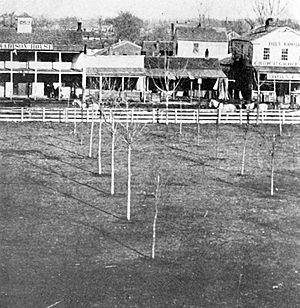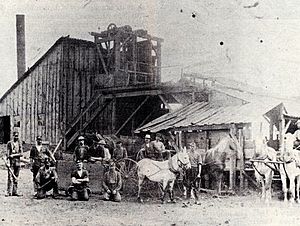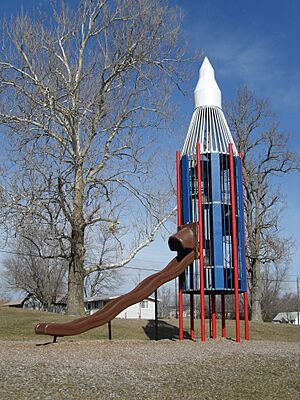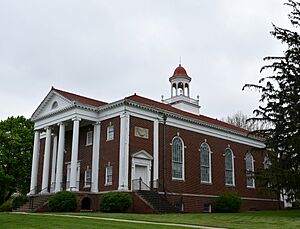Oskaloosa, Iowa facts for kids
Quick facts for kids
Oskaloosa, Iowa
|
|
|---|---|
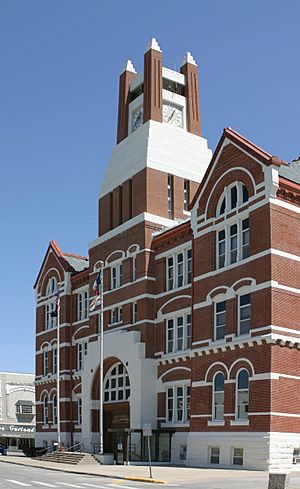
|
|
| Nickname(s):
Osky
|
|
| Motto(s):
"Note the Difference"
|
|
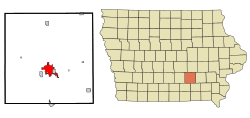
Location of Oskaloosa, Iowa
|
|
| Country | |
| State | |
| County | Mahaska |
| Incorporated | February 4, 1875 |
| Area | |
| • Total | 8.04 sq mi (20.81 km2) |
| • Land | 8.02 sq mi (20.77 km2) |
| • Water | 0.01 sq mi (0.04 km2) |
| Elevation | 846 ft (258 m) |
| Population
(2020)
|
|
| • Total | 11,558 |
| • Density | 1,440.97/sq mi (556.38/km2) |
| Time zone | UTC-6 (Central (CST)) |
| • Summer (DST) | UTC-5 (CDT) |
| ZIP code |
52577
|
| Area code(s) | 641 |
| FIPS code | 19-59925 |
| GNIS feature ID | 468480 |
Oskaloosa is a city in Iowa. It is the main town, or county seat, of Mahaska County, Iowa. Long ago, in the late 1800s and early 1900s, Oskaloosa was a very important place for mining bituminous coal. In 2020, about 11,558 people lived there.
Contents
History of Oskaloosa
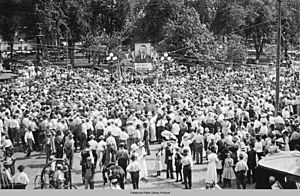
Oskaloosa gets its name from Ouscaloosa. She was a Creek princess who married Seminole chief Osceola. Some people used to think her name meant "last of the beautiful." However, in the Mvskoke-Creek language, "Oskaloosa" actually means "black rain." This comes from the words "oske" (rain) and "lvste" (black).
The first European-American settlers arrived in 1835. They were led by Nathan Boone, the youngest son of the famous frontiersman Daniel Boone. They chose this spot for the first Fort Des Moines. It was on a high ridge between the Skunk and Des Moines rivers. This ridge was first called the Narrows.
The town was officially planned in 1844. That's when William Canfield moved his trading post to Oskaloosa. The state government also chose Oskaloosa to be the county seat that same year.
Railroads and Growth
Railroads helped Oskaloosa grow. The Des Moines Valley Railroad arrived in 1864. Later, other railroads like the Central Iowa Railway and the Burlington and Western Railway also came to town. These railways made it easier to transport goods and people.
On January 6, 1882, a big explosion happened. It severely damaged many buildings in Oskaloosa. Most of the glass windows in the area were broken. Sadly, three boys died in the explosion. They had been seen shooting at a gunpowder storage building outside of town.
Coal Mining in Oskaloosa
The first bituminous coal mine in the area opened around 1853. Robert Seevers started it by digging into a coalbed near a creek. At first, people only mined coal for local use. But once the railroads arrived, coal from Oskaloosa was shipped far away.
By the 1880s, over one million tons of coal were mined in the county from 38 mines. In 1887, there were 11 coal mines in or near Oskaloosa. By 1895, Mahaska County produced more coal than any other county in Iowa. Coal mining was the main industry in the region in 1911.
Several large coal-mining towns were near Oskaloosa. Muchakinock was about five miles south of town. Lost Creek was another company town with about 500 people in 1905.
On January 24, 1902, there was a mine explosion at Lost Creek No. 2 mine. A miner accidentally caused a coal dust explosion. This set off barrels of gunpowder stored in the mine. Twenty men died, and 14 more were badly hurt. This event led to a statewide miners' strike. Because of this, a new law was made in 1903 to control blasting in coal mines.
Geography and Climate
Oskaloosa covers about 7.45 square miles (19.3 square kilometers). Most of this area is land, with a small amount of water.
Oskaloosa's Climate
Oskaloosa has a climate with hot summers and cold winters. It's known as a hot-summer humid continental climate. This means it has four distinct seasons.
| Climate data for Oskaloosa, Iowa, 1991–2020 normals, extremes 1893–present | |||||||||||||
|---|---|---|---|---|---|---|---|---|---|---|---|---|---|
| Month | Jan | Feb | Mar | Apr | May | Jun | Jul | Aug | Sep | Oct | Nov | Dec | Year |
| Record high °F (°C) | 69 (21) |
78 (26) |
88 (31) |
92 (33) |
106 (41) |
104 (40) |
112 (44) |
112 (44) |
101 (38) |
96 (36) |
82 (28) |
75 (24) |
112 (44) |
| Mean maximum °F (°C) | 53.1 (11.7) |
58.3 (14.6) |
73.1 (22.8) |
81.5 (27.5) |
86.9 (30.5) |
90.9 (32.7) |
94.5 (34.7) |
93.4 (34.1) |
90.1 (32.3) |
83.6 (28.7) |
69.2 (20.7) |
57.7 (14.3) |
96.4 (35.8) |
| Mean daily maximum °F (°C) | 30.7 (−0.7) |
35.9 (2.2) |
49.3 (9.6) |
62.2 (16.8) |
72.2 (22.3) |
81.5 (27.5) |
85.5 (29.7) |
83.8 (28.8) |
77.4 (25.2) |
64.5 (18.1) |
49.3 (9.6) |
36.2 (2.3) |
60.7 (16.0) |
| Daily mean °F (°C) | 21.5 (−5.8) |
25.9 (−3.4) |
38.3 (3.5) |
50.1 (10.1) |
61.5 (16.4) |
71.2 (21.8) |
75.2 (24.0) |
72.9 (22.7) |
65.2 (18.4) |
52.8 (11.6) |
38.9 (3.8) |
27.2 (−2.7) |
50.1 (10.0) |
| Mean daily minimum °F (°C) | 12.2 (−11.0) |
15.9 (−8.9) |
27.3 (−2.6) |
38.1 (3.4) |
50.8 (10.4) |
60.8 (16.0) |
64.8 (18.2) |
62.0 (16.7) |
53.0 (11.7) |
41.2 (5.1) |
28.5 (−1.9) |
18.2 (−7.7) |
39.4 (4.1) |
| Mean minimum °F (°C) | −10.0 (−23.3) |
−4.4 (−20.2) |
6.7 (−14.1) |
23.0 (−5.0) |
36.0 (2.2) |
48.0 (8.9) |
54.1 (12.3) |
51.5 (10.8) |
38.0 (3.3) |
25.6 (−3.6) |
11.5 (−11.4) |
−2.4 (−19.1) |
−13.7 (−25.4) |
| Record low °F (°C) | −31 (−35) |
−31 (−35) |
−30 (−34) |
6 (−14) |
24 (−4) |
36 (2) |
44 (7) |
36 (2) |
20 (−7) |
3 (−16) |
−7 (−22) |
−30 (−34) |
−31 (−35) |
| Average precipitation inches (mm) | 1.75 (44) |
1.74 (44) |
2.15 (55) |
3.92 (100) |
4.71 (120) |
5.18 (132) |
4.40 (112) |
5.08 (129) |
3.56 (90) |
2.68 (68) |
2.20 (56) |
1.35 (34) |
38.72 (984) |
| Average snowfall inches (cm) | 5.6 (14) |
8.6 (22) |
3.8 (9.7) |
0.6 (1.5) |
0.0 (0.0) |
0.0 (0.0) |
0.0 (0.0) |
0.0 (0.0) |
0.0 (0.0) |
0.0 (0.0) |
0.8 (2.0) |
5.7 (14) |
25.1 (63.2) |
| Average precipitation days (≥ 0.01 in) | 5.6 | 6.0 | 7.0 | 10.0 | 11.5 | 10.2 | 8.5 | 8.8 | 7.2 | 7.4 | 6.3 | 6.1 | 94.6 |
| Average snowy days (≥ 0.1 in) | 3.3 | 3.5 | 1.4 | 0.3 | 0.0 | 0.0 | 0.0 | 0.0 | 0.0 | 0.0 | 0.5 | 2.8 | 11.8 |
| Source 1: NOAA (average snowfall/snow days 1981–2010) | |||||||||||||
| Source 2: National Weather Service | |||||||||||||
People of Oskaloosa
| Historical population | |||
|---|---|---|---|
| Census | Pop. | %± | |
| 1850 | 625 | — | |
| 1860 | 4,393 | 602.9% | |
| 1870 | 3,204 | −27.1% | |
| 1880 | 4,598 | 43.5% | |
| 1890 | 6,558 | 42.6% | |
| 1900 | 9,212 | 40.5% | |
| 1910 | 9,466 | 2.8% | |
| 1920 | 9,427 | −0.4% | |
| 1930 | 10,123 | 7.4% | |
| 1940 | 11,024 | 8.9% | |
| 1950 | 11,124 | 0.9% | |
| 1960 | 11,053 | −0.6% | |
| 1970 | 11,224 | 1.5% | |
| 1980 | 10,989 | −2.1% | |
| 1990 | 10,632 | −3.2% | |
| 2000 | 10,938 | 2.9% | |
| 2010 | 11,463 | 4.8% | |
| 2020 | 11,558 | 0.8% | |
| U.S. Decennial Census | |||
2020 Population Data
In 2020, Oskaloosa had 11,558 people living in 4,664 households. The city had about 1,441 people per square mile. Most residents (88.9%) were White. Other groups included Black or African American (3.1%), Asian (1.8%), and Native American (0.2%). About 3.0% of the population was Hispanic or Latino.
About 27.9% of households had children under 18. The average age in the city was 37.3 years. About 25.4% of residents were under 20. The population was almost evenly split between males (48.6%) and females (51.4%).
Economy and Jobs in Oskaloosa
Oskaloosa has many different types of businesses. Here are some of the top employers in the city:
| Employer | Type of Business | Approximate Number of Employees | Description of Services |
|---|---|---|---|
| Musco Lighting | Sports Lighting | 450 | Provides lights for major sports places around the world. |
| Oskaloosa Community Schools | Education | 375 | Includes a high school, middle school, elementary school, and preschool. |
| Mahaska Health Partnership | Healthcare Services | 450 | Offers hospital services, including surgery and emergency care. |
| Clow Valve Company | Manufacturing | 350 | Makes fire hydrants and different types of valves. |
| Wal-Mart | Retail Department Store | 265 | |
| William Penn University | Education | 300 | A private university. |
| City of Oskaloosa | Municipal Government | 199 | Runs the city's services. |
| Hy-Vee | Retail Food Store | 155 | A chain of grocery stores. |
| Cunningham Incorporated | Mechanical Contractor | 100 | Works on heating, cooling, plumbing, and industrial services. |
| Mahaska Bottling Company | Soft Drinks | 97 | A Pepsi-Cola bottling company. |
Oskaloosa is also home to the C.L. Barnhouse Company, which publishes music.
Arts and Culture in Oskaloosa
Annual Events and Festivals
Oskaloosa hosts several fun events each year:
- The Southern Iowa Fair is one of the biggest county fairs in Iowa. It happens every July.
- Art on the Square takes place each June. It features local and regional artists on the city square.
- Sweet Corn Serenade is held every July. It's a concert by the city band with corn-on-the-cob and pork burgers.
- Each December, the Lighted Christmas Parade travels through downtown. Floats are covered in lights for this evening event.
Education in Oskaloosa
Oskaloosa is home to William Penn University. This is a private university that focuses on liberal arts. It was started by the Religious Society of Friends (Quakers) in 1873. It was first called Penn College. Its name changed to William Penn College in 1933 and then to William Penn University in 2000.
The city also has the Oskaloosa Community School District. This public school system includes a high school, a middle school, and an elementary school. Oskaloosa Elementary opened in 2005. It brought together five smaller schools into one large building. It is the biggest elementary school in Iowa.
Oskaloosa Christian Grade School was founded in 1946. SonShine Preschool is also in the same building.
Transportation in Oskaloosa
Oskaloosa has local transit services called Oskaloosa Rides. There is free bus service along one route on Mondays, Wednesdays, and Fridays. This service runs from 9:00 AM to 5:30 PM. Other special transit services are available daily.
Unique Features of Oskaloosa
Chief Mahaska Statue
In the city's town square, you can find a bronze statue of Chief Mahaska. He was a leader of the Ioway Native American tribe in the 1800s. Mahaska County is named after him. The statue was made by an Iowa-born sculptor named Sherry Edmundson Fry. It was finished in 1907. Fry won an award for this sculpture in Paris.
Frank Lloyd Wright Homes
Oskaloosa is special because it has two private homes designed by the famous American architect Frank Lloyd Wright. These homes were built between 1948 and 1951. They are examples of his "Usonian" style.
Historical Events
Oskaloosa hosted the Iowa State Fair in 1858 and 1859. This was before the Civil War. In 1934, Oskaloosa became the first city in the United States to fingerprint all of its citizens, including children.
Oskaloosa's Municipal Band
Music has always been important in Oskaloosa. The first settlers loved music. A town band was formed in 1864. In 1882, the city built a two-story bandstand in the city park. The band became very popular in the Midwest.
Charles L. Barnhouse helped the band become even better when he arrived in 1891. His band became famous across the state. They were even the official band for the Iowa State Fair for four years. In 1904, the band played at the 1904 World's Fair in Saint Louis, Missouri.
In 1911, citizens decided to improve the city park. They voted to build a new bandstand. The first concert in the new bandstand was on June 1, 1912. It was officially dedicated on July 25, 1912.
Famous People from Oskaloosa
Many notable people have come from Oskaloosa:
- Eddie Anderson, a football coach at the University of Iowa.
- Max Bennett, a jazz musician.
- Chester Conklin, a comedian and actor.
- Frank Friday Fletcher, an Admiral and Medal of Honor winner.
- Patrick O'Bryant, a National Basketball Association player.
- Arthur Russell, a modern music composer.
- Tyler Sash, a football player who won the Super Bowl with the New York Giants.
- Al Swearengen, a famous saloon owner in Deadwood, South Dakota.
Images for kids
See also
 In Spanish: Oskaloosa (Iowa) para niños
In Spanish: Oskaloosa (Iowa) para niños
 | Mary Eliza Mahoney |
 | Susie King Taylor |
 | Ida Gray |
 | Eliza Ann Grier |




